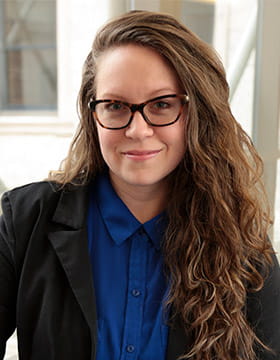- Share
Optimism at the OB
The Cleveland Fed’s president and one senior vice president reveal what they expect for the economy and for bankers facing new rules
https://www.youtube.com/watch?v=TOSEhsDO5VI
Before a sold-out crowd in Columbus on Wednesday, February 4, Cleveland Fed president and CEO Loretta J. Mester shared her perspective on the US economy, and senior vice president of banking supervision Stephen H. Jenkins addressed the ability of Ohio bankers to meet new capital requirements.
Their talking points differed, but attendees noticed Mester and Jenkins had this much in common: optimism.
Mester spoke first, delivering the keynote address. “There are accumulating signs that the economy is building momentum and that, this time, a pickup in speed will be sustained because the underlying fundamentals have improved,” she said, later quantifying the improvement she expects to see.
The difference between her expectation — for 3 percent growth in 2015 and 2016 — and that shared by Lindsey Piegza, whose forecast preceded Mester’s, caught some bankers’ attention. (Piegza, chief economist with Sterne Agee, had forecast lower “modest but positive” growth.)
“I was surprised by the divergence in opinions between them,” said one thrift director. “They were 50 basis points apart. A lot of decisions we make in our institution depend on the outlook for interest rates and growth in the economy.”
More than 350 bankers, legislators, and professional service providers attended the Ohio Bankers League’s sixth annual economic summit. One of them — a banker from metropolitan Cleveland — said the forecasts shared by Mester and Piegza are consistent with what he’s heard.
“The growth is slow and tepid,” he said. But, he added, “in relation to the Fed raising rates between now and ’16, it still looks like a fairly stable year this year.”
Mester said she believes it soon will be appropriate to begin moving rates up from zero; in fact, she noted “if incoming economic information supports my forecast, I would be comfortable with liftoff in the first half of this year.” That said, policy is not on a preset path, Mester noted.
Mester concluded with one final thought about the Federal Reserve’s independence in making monetary policy decisions.
“I believe that calls to audit the Fed are misnamed and misguided,” she said. “Misnamed because they really aren’t about auditing the Fed — the Fed is already subject to many audits of its financial statements and activities, and Chair Yellen regularly testifies before Congress on monetary policy. Misguided because they really are about allowing political considerations to influence monetary policy decisions. This would be a tremendous mistake because it would ultimately lead to poorer economic performance. I strongly believe that the Federal Reserve’s independence in setting monetary policy is worth preserving.”
A good starting point
Following Mester’s and Piegza’s addresses, Jenkins joined three others in a panel discussion about ongoing capital requirements for banks, thrifts, and holding companies. He emphasized that Basel III, a new capital rule that took effect January 1 and entails staggered phases, is intended to improve the quantity and quality of bank capital, and then said Ohio banks appear to meet the new capital requirements that won’t be fully in effect until 2019.
“Across the country, most community banking organizations already meet the higher standards,” he said.
Bankers were happy to hear it.
“It surprised me how good of condition Ohio banks are in relative to the new capital standards,” said Linda Bowyer, a board director for the Bank of Maumee. “That’s a good starting point. In 2008-2009, we had a pretty severe banking crisis.”
“So, to have all [Ohio banks] well-capitalized — you’d think you’d have stragglers from the 2008 era,” added Kevin Rahe, president of the Bank of Maumee.
Even if it’s been established that “most banks don’t need capital,” panelist Charlie Crowley, an investment banker with Boenning & Scattergood, Inc., noted many still are seeking it for the purpose of growing their institutions.
“The good news is, there are opportunities to raise capital if you want to,” Crowley said. “That wasn’t necessarily the case 5 years ago.”
The Federal Reserve System is set to continue the conversation about new capital requirements, specifically Basel III, with bankers during an Ask the Fed call-in session at 2 pm on Feb. 19. To register: www.askthefed.org.


